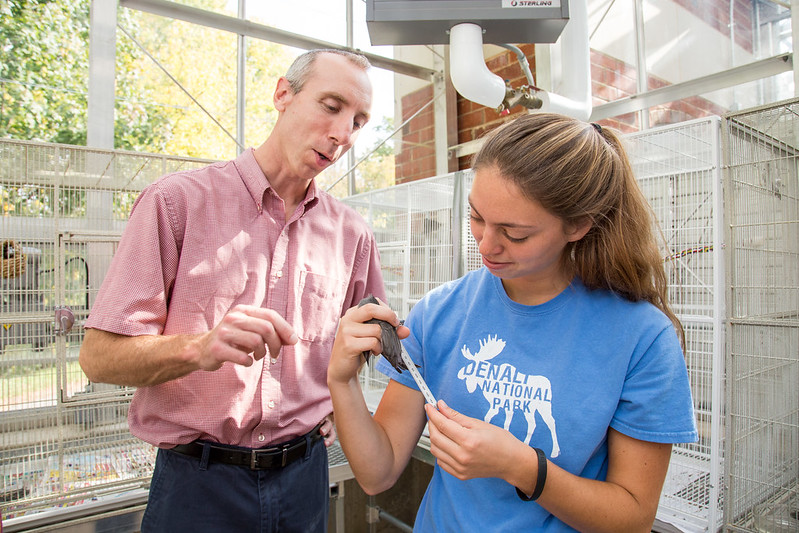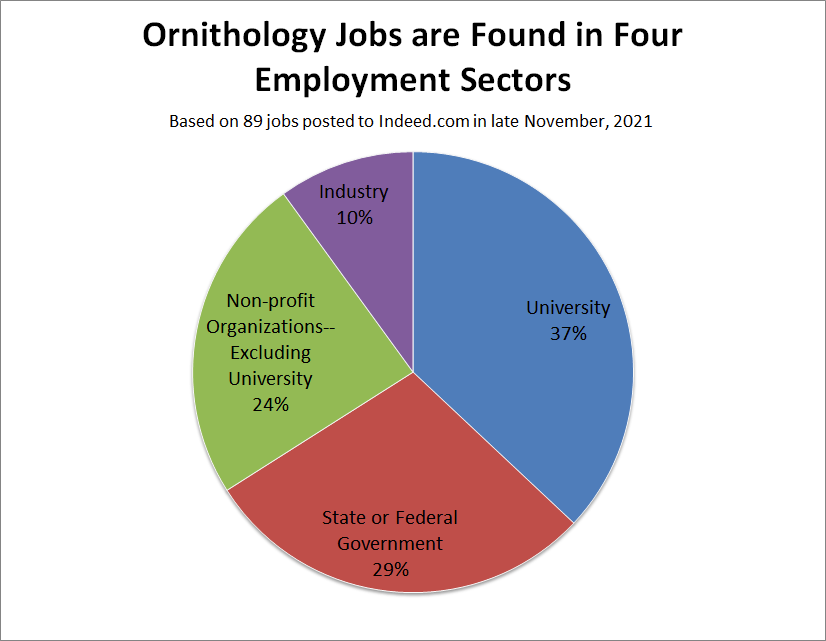Together, We Succeed.
Saint Vincent College Helps Students Pursue Ornithology Careers

I recently met with a prospective student and when I asked her what she was interested in, she said “Ornithology and wildlife biology.” I smiled broadly under my Covid-19 mask and said “That’s perfect, because that’s what I do at Saint Vincent!” It was pure coincidence that I happened to be on the recruiting schedule that day.
When students are considering a career in ornithology, they will wonder what kind of work they might do when they complete their education, and who might be their employer. These are good questions asked by students considering any field of study. When I am asked about ornithology careers, I usually say that most are in three categories: (1) academic positions like mine, (2) government jobs, or (3) non-profit conservation and educational organizations. These are good jobs with high job satisfaction. But there is plenty of competition for most of them because the field of ornithology simply doesn’t require a lot of practitioners. For example, ornithologists don’t make or build things sold in stores. We don’t provide services that are widely marketable. We don’t cure disease. Nevertheless, the study of birds is still a highly respectable career choice, and society truly values us, even if we don’t contribute much to the national economy.
Let me provide some data to back up my claims. I searched Indeed.com recently, looking for job postings that included the word “ornithology” in them. I found 89 jobs:

University positions accounted for 37% of job postings. Many of them were from the Cornell Laboratory of Ornithology, which employs information technology specialists, educators, journalists, research scientists, and accountants.
Government jobs accounted for 29% of postings. These included park naturalist, wildlife biologist, and conservation biologist positions at state and federal agencies.
Jobs in the non-profit sector accounted for 24% of the postings. These included jobs at zoos and museums; environmental educator positions at nature centers, and wildlife biologist and conservation biologist positions at large non-governmental organizations like the National Audubon Society and the Nature Conservancy.
Industry accounted for the remaining 10% of job postings. These included positions in ecotourism, environmental consulting, and conservation. There are many medium-sized companies that employ ornithologists to do surveys to ensure that proposed land use developments are consistent with environmental statutes and regulations.
Indeed.com does surveys and computes a “work happiness” score for selected companies and workplaces. I didn’t go through all 89 jobs to look at their scores, but I clicked on six on the first page of results, and all the employers were given above-average scores.
Ornithology is a very small field. While 89 jobs sounds like a lot, when I typed “geology” into the Indeed.com search bar, more than 3,200 jobs were listed. When I searched for “dentistry” jobs, I got 25,000 hits. I’m not encouraging anyone to skip their dream of being an ornithologist to become a dentist, but the fact remains my student s will need to bolster their ornithological resumes to be competitive. Also, the 89 ornithological jobs were scattered all over the country, so students wanting to pursue ornithology as a career need to be prepared to travel far from home.
Can a Saint Vincent College student get one of these rare jobs in ornithology? Absolutely! Here’s why:
- The college’s core curriculum ensures that students learn how to learn and be well-versed in the liberal arts so they are prepared for a wide-ranging career. Even professional ornithologists benefit from developing expertise in sociology, anthropology, foreign language, writing and communication, fundraising and accounting, and the legal and political systems.
- Every Biology or Environmental Science student at Saint Vincent completes an undergraduate thesis project, and these projects give the students a valuable experience that is especially important for getting into graduate school. The projects are three semesters long and are conducted on a topic that is chosen by the student with some faculty input. This is something that makes our programs unique. At other colleges, the students usually work on their professor’s research project. That can certainly happen here at Saint Vincent, but it doesn’t have to be that way. In any case, the research project teaches the student how to use scientific literature to develop a hypothesis, how to test the hypothesis, and how to analyze the data to evaluate the hypothesis. Along the way, the student learns to write a grant proposal, come up with a budget, and prepare an animal care and use protocol as required by federal regulations. A public presentation is required by the end of the student’s senior year.
- Students are taught how to identify more than 200 species of birds by sight and sound. They do this in the context of the World Series of Birds course I teach.
- Students are taught various research techniques used by professional ornithologists including bird capture and banding; assessing bird sex, age, and health; bird surveys; song analysis; habitat assessments; radio-telemetry and home range analysis; behavioral observations in the field; and plant identification.
- The facilities available at Saint Vincent contribute to the ornithology student’s experience. We have a small animal facility and a greenhouse that can be used for housing wild birds on a temporary basis for research purposes. We have a laboratory room dedicated to our research program where blood, feathers, and other tissues can be analyzed for certain hormones, parasites, and pollutants.
- The college has 200 acres of land surrounding campus that students use for field work. The landscape is a mix of agricultural fields, wooded corridors, and grasslands managed for bird conservation (the latter can be found within the Winnie Palmer Nature Reserve adjacent to campus). The college also manages a set of artificial wetlands where numerous bird species breed or visit while on migration. There are also many public wildlands for students to conduct field studies within a short drive of campus.
- We have a proven record of graduates getting jobs in ornithology or a related field. One former student who graduated in 2010 works for Audubon Louisiana as a Coastal Stewardship Manager. Another, who graduated in 2015, works as an animal trainer at the National Aviary. Two recent graduates from 2021 have just entered graduate programs in Biological Science at Duquesne University and Clemson University, respectively.
During my meeting with the prospective student, I made sure to highlight all of the above, except I forgot to tell her about the four former students I mentioned above. I am sorry I skipped them! They are living the dream, studying birds and other wild animals, and working toward the conservation of life on Earth. They are making a difference, and we’re proud to call them Saint Vincent Bearcats.
This article is written by Dr. Jim Kellam, Associate Professor of Biology at Saint Vincent College.

